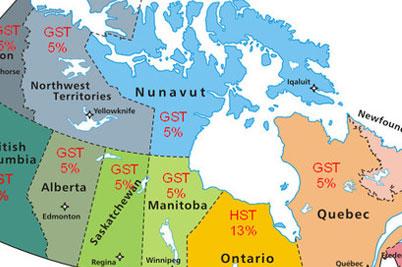


Why do you need to register for GST/HST or QST? What are the benefits of registration? What is ITC? Most of these questions we are trying to answer through this article and will also include the obligations you may have for the payment and filing.
The GST/HST is a indirect tax that is charged to the consumer at the time of sale on all taxable supplies in Canada, collected by the supplier selling those taxable supplies, and remitted to CRA before the due date. Supplies include the supply of goods and services. You may be eligible to claim an input tax credit (ITC) and deduct from the GST/HST you have collected from your customers and remit the net amount to CRA. ITC is the portion of GST/HST that you have paid or have payable on the purchase of your goods, supplies, and services used in your business.
Each province in Canada has its own GST/HST or QST requirements. In Ontario, once you are registered for GST/HST with CRA you do not need again to register with Ontario. However, in Quebec, you need to register with Revenue Quebec, in addition, to registering with CRA and filing an additional GST/QST return with Revenue Quebec.
For GST/HST rates by provinces, please visit “Federal and provincial rates.”
When do I need to register for GST/HST?
How to register?

You can register by signing in to CRA my business account or call RKB Accounting for free GST/HST registration.
You do not need to register for GST/HST even if you have exceeded the above-mentioned threshold if you are only providing supplies of exempted goods. Exempted supplies i.e. goods and services are not taxable and have no GST/HST however they are different than zero-rated supplies. If you are supplying goods or services that are exempt from GST/HST then you can not claim an input tax credit (ITC) on the expenses that you would have incurred in your business. However, if you are supplying goods or services that are zero-rated for GST/HST, you are entitled to claim an input tax credit (ITC) on the expenses that you would have incurred in your business.
After your GST/HST is registered?
– You have to charge GST/HST (13% in Ontario) on all your invoices to the customer for all taxable supplies.
– Your GST/HST Registration number must appear on all invoices to customers.
– You have to prepare and file your GST/HST return before the due date.
– If you have GST/HST payable you will need to remit the net amount to CRA before the due date.
– In case of default, CRA will charge you penalties for both late filing or late payment.
– You need to file your GST/HST return even if you are filing a nil return.
A quick method of accounting or the simplified method for claiming ITCs
– This is an option provided to small businesses to reduce their paperwork.
– This method restricts your ability to claim a full input tax credit (ITC).
– You can elect this method if your revenue is not more than $400,000.00 in a year.
– Certain types of businesses are not eligible to elect this method.
– You charge regular GST/HST to your customer as per the applicable rate.
– You remit GS/HST to CRA based on the applicable quick method.
Input Tax Credit (ITC)
You purchase goods in order to sell these to your customers. You incur expenses to run your business, like rent, office expenses, telephone, and many more. On all these expenses, you also pay applicable GST/HST, which you can as ITC.
List of some ordinary expenses on which you can claim ITC:
You can not claim ITC on your personal expenses or expenses incurred to sell goods or services exempted for GST/HST purposes. A few common examples of exempted goods or services that are exempted from GST/HST are basic grocery, financial services, insurance, etc.
You need to maintain and keep the records for all your ITC claims.
You claim and deduct ITC from your total GST/HST collected in the period you have ITC payable or paid. If you did not claim in a particular period, generally, you have four years to claim ITC.
GST/HST payment and filing deadlines
| Filing Frequency | Filing due date | Payment due date |
| Monthly filer | One month after the end of the month | One month after the end of the month |
| Quarterly filer | One month after the end of the quarter | One month after the end of the quarter |
| Corporation – annual | Three months after the end of the year | Three months after the end of the year |
| Self-employed annual | June-15 | April 30th |
| Annual taxable supplies threshold amounts | Assigned reporting period | Optional reporting periods |
|---|---|---|
| $1,500,000 or less | Annual | Monthly, Quarterly |
| More than $1,500,000 up to $6,000,000 | Quarterly | Monthly |
| More than $6,000,000 | Monthly | Nil |
Installment Payments
If you are an annual filer and your net tax for the previous fiscal year was $3,000 or more, and your net tax for the current fiscal year is $3,000 or more, you have to make quarterly instalment payments during the current fiscal year, even if you have a rebate that reduces your amount owing to less than $3,000. If you do not remit instalments, you may incur penalty and interest.
RKB Accounting has expertise in cross-border taxation and has been providing accounting and taxation services for the last fifteen years in Canada and USA. RKB services include incorporating a business on both sides of the border, bookkeeping, sales tax, payroll, and corporate and personal income tax. RKB’s expertise includes cross-border tax planning, long-term tax planning, helping business start-ups, business structure planning, and resolving complex tax matters. RKB a CPA(Delaware), CA(India), and CIA(USA) has over 25 years of experience in accounting and taxation in dealing with various countries in the world.
Disclaimer: Information in the blog/post/article has been presented for a broad and simple understanding. This is not legal advice. RKB Accounting & Tax Services does not accept any liability for its application in any real situations. You need to contact your accountant or us for further information.